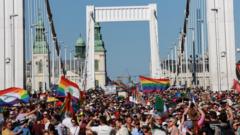The recent decision by South Korea's military to halt its loudspeaker propaganda broadcasts across the border to North Korea marks a significant shift in the approach to inter-Korean relations. This move, intended to "restore trust" between the two nations, follows the election of President Lee Jae-myung, who prioritized dialogue with North Korea during his campaign. However, reactions to the suspension are mixed, with some advocating for human rights in North Korea expressing concern over the potential isolation of its citizens.
South Korea Halts Propaganda Broadcasts to North Korea Amid Tensions

South Korea Halts Propaganda Broadcasts to North Korea Amid Tensions
In a strategic shift, South Korea's military has ceased loudspeaker propaganda aimed at North Korea, signaling a potential thaw in relations following the election of President Lee Jae-myung.
The military announced the suspension of loudspeaker broadcasts aimed at North Korea, emphasizing an effort to improve relations after the election of President Lee Jae-myung, who campaigned for dialogue with Pyongyang. The broadcasts, which resumed in June 2022 after a six-year hiatus, were seen by North Korea as aggressive provocations, prompting threats against them. Previously, the loudspeakers conveyed various messages, including news and information about democracy, aimed at North Korean citizens.
This latest development comes in stark contrast to the more hardline stance taken by former President Yoon Suk Yeol, who faced criticism and subsequent impeachment for his actions during his tenure. In the wake of Yoon's administration, community feedback from residents near the border has been largely supportive of the decision, with many noting the disruptions caused by the incessant noise from the loudspeakers.
However, humanitarian organizations have voiced strong opposition to the suspension, arguing that the broadcasts served as a crucial connection to the outside world for North Koreans living under oppressive conditions. Hana Song, director of the Database Center for North Korean Human Rights, warned that this action could reinforce Kim Jong Un's regime by further isolating its citizens from vital information.
Despite this pause, the military signaled that the loudspeakers could be reactivated if necessary, suggesting that the possibility of propaganda broadcasts could be contingent upon future North Korean actions. The implications of this move highlight the delicate balance of maintaining national security while striving for improved inter-Korean relations, especially given that both countries remain technically at war since the Korean War armistice in 1953. As diplomatic dynamics evolve, the focus remains centered on the potential for peace and cooperation on the Korean Peninsula.





















